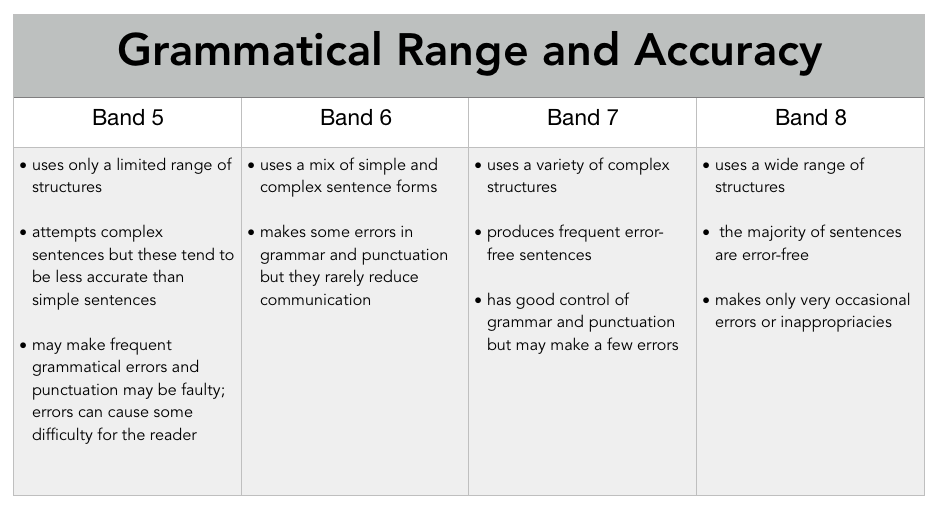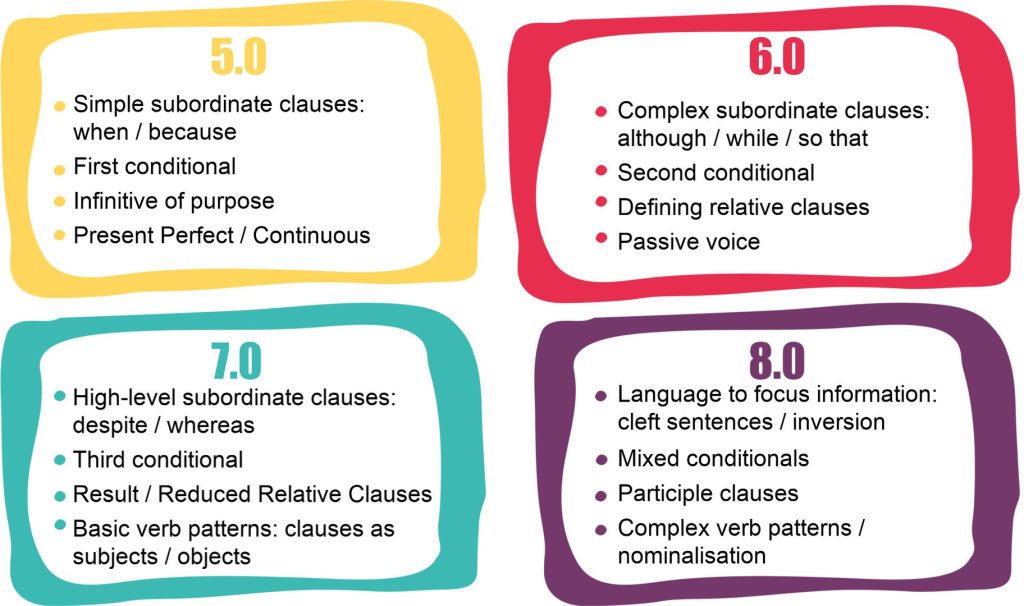Mastering Grammar for IELTS Success: A Comprehensive Guide
Grammar, often considered the backbone of a language, plays a pivotal role in language proficiency examinations like the International English Language Testing System (IELTS). Mastery of grammar is indispensable for achieving a high band score in the IELTS exam. Correct usage of sentence structures, appropriate word order, precise tenses, accurate punctuation, and understanding the dynamics of passive and active voice are crucial aspects of grammar that candidates need to grasp.
In this article, we explore the significance of grammar for IELTS exam, focusing on key elements that can significantly enhance a candidate’s performance and contribute to a successful outcome.

1. Is grammar important in IELTS?
Grammar is a crucial component of language proficiency and is assessed in both the writing and speaking sections of the IELTS test. Proper grammar usage allows you to convey your ideas accurately, coherently, and effectively, enhancing your overall communication.
In the IELTS writing section, your ability to use a range of grammatical structures correctly, including complex ones, is crucial for achieving a higher band score. Grammatical accuracy and a varied use of sentence structures are among the assessment criteria.
In the IELTS speaking section, demonstrating a good grasp of grammar is equally vital. Using correct tenses, subject-verb agreement, appropriate articles, and other grammatical features contribute to a higher score. It showcases your ability to communicate fluently and precisely.
2. How does grammar contribute to the IELTS benchmark?
The IELTS exam evaluates grammar in both the writing and speaking sections. Here’s how grammar impacts your band score in these sections:
2.1. Writing Section
- Grammatical Range and Accuracy (25% of the Writing Band Score): This criterion assesses the variety and accuracy of your sentence structures. Using a range of complex sentences accurately can lead to a higher score.
- Sentence Structure and Cohesion (25% of the Writing Band Score): Proper usage of cohesive devices, such as linking words and connectors, is crucial. It helps in creating a logical flow of ideas and enhances coherence in your writing.
2.2. Speaking Section
- Grammatical Range and Accuracy (25% of the Speaking Band Score): This evaluates the range and accuracy of your grammar, including the use of verb tenses, articles, subject-verb agreement, and more.
- Fluency and Coherence (25% of the Speaking Band Score): Although not directly labeled as grammar, fluency is affected by your ability to use appropriate grammar without hesitations or interruptions. Coherence, influenced by proper grammar, also impacts this criterion.
2.3. Overall Impact
- Higher Band Scores: Demonstrating a wide range of grammatical structures accurately throughout your responses can lead to higher band scores in the respective sections. Varied, correct usage of grammar reflects your proficiency and complexity in the language.
- Clarity of Communication: Proper grammar ensures that your ideas are conveyed clearly and accurately, improving the overall coherence and cohesion of your writing and speaking responses.
- Language Appropriateness: Using grammar appropriately for different tasks (formal writing, informal speaking) showcases your understanding of the context and appropriateness of language use.
In essence, grammar is a fundamental aspect of your IELTS performance. A strong command of grammar, including a wide variety of accurate structures, contributes significantly to achieving a higher band score, indicating your language proficiency and communication abilities in academic and everyday contexts.

3. TOP 5 basic grammar for IELTS you must know
Grammar forms the bedrock of language, providing the structure and rules necessary for effective communication. In the context of the IELTS, a strong understanding of grammar is paramount. Here, we explore the top 5 fundamental grammar aspects that are vital for success in the IELTS exam, providing a deeper insight into each:
3.1. Sentence structures and forms
Understanding sentence structures and forms is foundational to constructing meaningful and coherent sentences. English sentences are categorized into three main types: simple, compound, and complex.
- Simple Sentences: These consist of one independent clause, conveying a single idea or thought. For instance, “She reads a book.”
- Compound Sentences: These involve two or more independent clauses connected by coordinating conjunctions like ‘and’, ‘but’, ‘or’. For example, “She reads a book, and he writes a letter.”
- Complex Sentences: These entail an independent clause (a complete idea) and one or more dependent clauses (incomplete ideas). An example is, “While she reads a book, he writes a letter.”
Understanding and using these structures appropriately allows you to convey ideas in a clear and organized manner, an essential skill for both the writing and speaking components of the IELTS exam.
3.2. Word order
Correct word order is fundamental in English to convey meaning accurately. The typical word order in English sentences is subject-verb-object (SVO). However, this order can change depending on the context or the type of sentence.
For example:
- SVO Order: “She (subject) reads (verb) books (object).”
- Question Order: “Does she (auxiliary verb) read (main verb) books (object)?”
Understanding the nuances of word order helps in constructing grammatically accurate sentences and improves your writing and speaking skills, crucial in achieving a high band score in IELTS.
3.3. Tenses
Tenses are a critical aspect of English grammar, indicating the time when an action occurred. In English, there are three primary tenses: past, present, and future, each with simple, continuous, perfect, and perfect continuous forms.
- Present Simple: Used for general truths and regular actions, e.g., “She works in an office.”
- Past Continuous: Describes ongoing actions in the past, e.g., “They were playing football yesterday.”
- Future Perfect: Indicates an action that will be completed before a specific point in the future, e.g., “By 5 p.m., I will have finished my work.”
3.4. Punctuation
Punctuation is the system of marks or signs used in writing to separate sentences and their elements and to clarify meaning. It includes commas, periods, question marks, exclamation marks, colons, semi-colons, etc.
- Commas (,): Used to separate items in a list, set off introductory elements, and more.
- Periods (.): Denote the end of a sentence.
- Question Marks (?): Indicate a question.
3.5. Passive and active voice
Understanding the difference between passive and active voice is vital for effective communication, especially in academic writing.
- Active Voice: The subject of the sentence performs the action, e.g., “The cat (subject) chased (verb) the mouse (object).”
- Passive Voice: The subject receives the action, e.g., “The mouse (subject) was chased (verb) by the cat (agent).”

4. Grammar for IELTS practice question
4.1. Sentence Structures and Forms
Rewrite the following simple sentence as a complex sentence:
She likes tea.
Answer: “Although she likes coffee, she prefers tea.”
4.2. Word Order
Rearrange the words to form a grammatically correct sentence:
“yesterday / He / basketball / played”
Answer: “He played basketball yesterday.”
4.3. Tenses
Choose the correct tense for the following sentence:
Example: “By tomorrow, she ________ (finish) her project.”
Options: a) will finish b) finishes c) will have finished
Answer: c) will have finished
4.4. Punctuation
Add the necessary punctuation to the sentence:
Example: “they are coming to the party”
Answer: “They are coming to the party.”
4.5. Passive and Active Voice
Rewrite the sentence in the passive voice:
Example: “The teacher explains the lesson.”
Answer: “The lesson is explained by the teacher.”
Grammar is the bedrock upon which effective communication is built. In the realm of the IELTS examination, a solid understanding and adept application of grammar are non-negotiable for aspirants striving to attain their desired band scores. The ability to construct sentences with diverse structures, maintain correct word order, choose appropriate tenses, punctuate accurately, and judiciously use passive and active voice can markedly elevate a candidate’s language proficiency and coherence.
Moreover, these skills directly impact the writing and speaking components of the IELTS exam, influencing the overall band score. Therefore, dedicating time and effort to honing grammar skills is a wise investment for anyone looking to excel in the IELTS exam and, by extension, in their academic and professional pursuits. Start doing IELTS online practice test now!